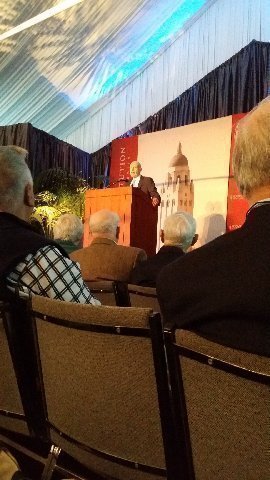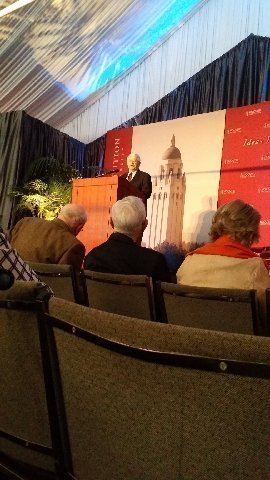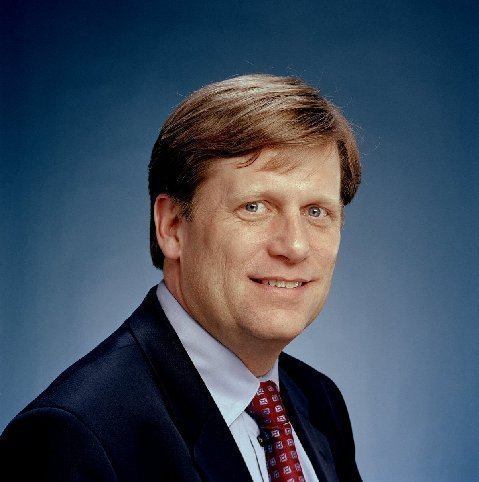Picto Diary - 19 October 2015 - 1st Day Hoover Retreat

Speaker Notes:
Above: Edward P. Lazear. Hoover Senior Fellow, Stanford Business School professor, and Chairman of Council of Economic Advisors for George Bush, 2006-2009. Hoover Retreat. Stanford University, Palo Alto, CA. 19 October 2015.
US Economy
US Economy is growing but at lower rates than historical recoveries.
Slower Europe and China growth impacts US, but, not in major way.
Growing debt most important US problem. Most economists see serious economic slowdown when US debt exceeds 90% GDP. Now 80% GDP.
Appreciating dollar doesn't have a major effect on US economy since US dependence on trade relatively low.

Speaker Notes:
Above: Caroline M. Hoxby. Senior fellow, Hoover. Prof of Economics, Stanford.
Hoover Retreat. Stanford University, Palo Alto, CA. 19 October 2015.
Inequality, intergenerational mobility, meritocracy often conflated, but, they are not the same.
Nothing has happened to intergenerational mobility over the years.
Opportunity in US is not worse than it used to be. All income cohorts are rising. Lowest income cohort his getting closer to the median.
Income inequality exists only above the 99th percentile of earners. Are the "poor" really worried about that?
Meritocracy unambiguously good in US.
We don't do enough for our high achieving, low income kids... who when provided with the opportunity achieve at top levels. High achieving, low income students are discouraged from going to top schools.
Must provide parents with school choice. Even the "vaunted" Sweden has a school choice voucher system.

Speaker Notes:
Above: John B. Taylor. Senior Fellow, Hoover and Stanford economics professor. From 2001 to 2005 Undersecretary of Treasury for international affairs. Hoover Retreat. Stanford University, Palo Alto, CA. 19 October 2015.
Recast history leading to Bretton Woods agreement in the 1930's. Two main rules came out of that history..
1. Don't do competitive devaluations.
2. Remove exchange and capital controls.
Countries worked hard to normalize under the new paradigm culminating in the Bretton Woods agreements.
Today, countries are slipping away from the international financial disciplines that have worked well for the last 70 years.
The world is much better off in a rules based financial framework, where government is limited... where people can make choices.
Q and A: We're better off without ExIm Bank. Has become a bastion of cronyism.
Speaker Notes:
Michael W. McConnell. Hoover Senior Fellow. Director Constitutional Law Center, Stanford Law School, Stanford University. 2002 to 2009, circuit judge US 10th Court of Appeals. Hoover Retreat. Stanford University, Palo Alto, CA. 19 October 2015.
Surprising Supremes term last season. Even New York Times called the Roberts Court the most liberal court since Warren. Clear leftward drift. High profile decisions - left oriented - on same sex marriage and Obama Care.
Kennedy typically 2/3 conservative and 1/3 liberal decisions. This term, he was the opposite.
Angrier tone (Scalia) in dissent than in years.
Democrat court appointees rulings in lockstep. Considerable difference amongst rulings of Pub appointees.
This is same phenomenon in the House of Representatives, by the way... where Democratic caucus votes in lock step but Pubs have wide differences of opinion. Pub House looks like a "goat rodeo."
Term ahead not a blockbuster term. 2 big cases now on docket:
Fisher versus Texas... second time to the court. In Michigan case, 2003, Gratz versus Bollinger, Supremes had allowed for affirmative action as long as it was used in a broader evaluation context. Fuzzy rules... difficult to interpret.
Texas legislature decided to admit top 10% of Texas high schools automatically to University of Texas. This, actually, resulted in a higher minority acceptance. Opponents want the Michigan rule enforced therefore challenge Texas Legislature decision.
2nd Case: Fredrichs versus California State Teachers Association.
Should teachers union members be required to pay dues when those dues are channeled to a political party with which they disagree?
Important case. Teachers Unions powerful politically. A victory for union opponents could result in cut-off of large funding to Democratic Party.
Note: In some later personal conversation with McConnell I discovered he has a neat hideaway cabin/second home in Wayne County, UT... my favorite place to get away that is reasonably close by.

Speaker Notes:
Above: Kori Schake. Hoover research fellow. Served at State, NSA, and Pentagon. Faculty at Johns Hopkins School of Advanced International Studies, theUniversity of Maryland, National Defense University and West Point. Hoover Retreat. Stanford University, Palo Alto, CA. 19 October 2015.
Our enemies could not have done greater damage to our military than was done by the sequester.
Jim Mattis, 11th Commander US Central Command (ME, Afghanistan, Iraq etc.)
US is no longer militarily dominant in...
* Military technological development
* Reliable communication. Example. Navy back to teaching sextant as back up in case of communication breakdown.
* Air dominance
* Time.. modern asymmetric warfare leaves little time to adapt.
Other Issues...
* Military wants 25 bases closed that Congress won't permit.
* 800K DOD employees. Too many by double. Impossible to fire.
* Retirement compensation (eating us alive).
* 2013. Waste. $74 billion spent on projects that were cancelled.
* Congress more interested in social issues than in who wins wars.
* Big bet placed on carriers. Britain gained hegemony via sea power until continental powers discovered railroads could move troops. US: Strategically, too many eggs in one basket?
Going forward....
* Need to learn to make choices leading to the fewest regrets.
* We need to re prioritize risks... China, Iran, North Korea, Russia. Our "pinpricks" have little or no effect on ISIS.

Speaker Notes:
Above: Joshua D. Rauh. Professor of Finance, Stanford Business School. Hoover Retreat. Stanford University, Palo Alto, CA. 19 October 2015.
Topic: State Business Taxation and Firm Mobility
Recent CA job losses.
Toyota - 4000 jobs
Charles Schwab - 1000 jobs
Mercedes Benz - 1000 jobs
Per California Governor Jerry Brown: "In aggregate we don't lose any business... yes, there are a lot of little taxes and regulatory hoops to jump through in California, but smart people figure out a way to make it work."
Stanford analysis using big data sets, distinguishing between C-Corp tax data and individual (pass through) corporate tax data show clear correlation between tax increases and loss of business in California.
Speaker Notes:
Michael McFaul. Senior Fellow at Hoover. Stanford professor of Political Science. US Ambassador to Russia from 2012 to 2014. Hoover Retreat. Stanford University, Palo Alto, CA. 19 October 2015.
What is Putin up to? He's afraid of his people... afraid of participatory democracy. He sees himself in the role of a "benign autocrat." He knows best what's for Russia.
Is Putin successful? Mixed. Short term yes. He's more secure in power today than he was three years ago. Won't be successful over time. No economic reform. No investment. Increased state control.
Also... long term political problem. There is no successor. Russia today is reflection of Putin personality and not a country with strong institutions where successors can work within the system. There is no system.
Also, I'm skeptical of 80% poll approval. You're an average working Joe in Russia... you get a call from a pollster, you know the long arbitrary reach of Putin and his secret police... what else are you going to answer, but yes, when asked if you support Putin?
His effort in Ukraine has backfired. Ukraine now strongly pro-Europe... pro-NATO... Ukraine has left Russia orbit forever. Russia is failing in its east Ukraine insurgency. Russia proxies unable to govern in east Ukraine.
Crimea was successful... but at a high cost. Sanctions.
Syria. Putin has been a supporter over the four years that Assad has weakened. By sending his military to Syria, why would anyone believe that Putin can achieve what the US cannot? Putin's mission seems to polarize ISIS versus Assad... to weaken anti Assad third parties supported by the United States. Ultimately, he wants to get US to support Assad.
What should US do? Ultimately Putin will fail. US must act to speed up this process:
1. US cannot allow Putin to succeed in Syria. US needs to beef up support for non ISIS anti Assad actors. US needs to consider "no-fly" zone.
2. US must publicly strengthen support for Ukraine, supporting their military and their economy.
3. Continue to strengthen NATO. More NATO troops need to be placed in front line locations.
4. Peel China and India away. Engage in actions around the world that increasingly isolate Putin.
5. Pass Trans Pacific Partnership... further isolating Russia economically.
Russia must be contained. US must not give up on Russian entrepreneurs (who come to talk to me regularly).
It could be a long slog. I'm not sure Russia is the type of society that will push back in the wake of economic depravation.
Russia will transition back to a democratic society. It will happen faster than you think. But not while Putin is in power.
(In response to audience question). Russians are very concerned about rise of radical Islam. 20% of Russia's population is Islamic. Russians have lost more of their secret police in the Caucusus over the last 10 years than the US has lost soldiers in Afghanistan.
Chechnya is Russia's model for Syria. Strong dictator, aligned with Russia, maintaining control of a subdued, quiescent Islamic (Sunni) population.
Speaker Notes:
Gary Roughead. Distinguished Visiting Fellow at Hoover. Served as 29th chief of US naval operations. Before dinner remarks. Hoover Retreat, 19 October 2015.
Middle East disorder. We're in for a long run...
We're in a period of questioning from our friends in the Middle East.
Expect big changes in Turkey and the Levant.
Iran will set the stage for the future of nukes.
But.... tonight.... China.
The last transfer of global leadership... from the UK to the US... was pretty seamless. We spoke the same language, had similar cultural traditions. This is not the scene with China today... where are cultures and value systems are very different one from the other.
China has significant demographic problems in aftermath of its "one child" policy.
Xi has made great effort to attack corruption in China.
US and China are interdependent. Game on. How does it play out in time, space? What are the rules?
We have had problems with China since 1819.
Players:
Abe.... Japan is changing its view of its military responsibilities in the region.
Xi....In power through 2022.
Putin.... In power through 2024... and then, who knows how long? They'll lose far east to China... but, not in the short run.
Australia... Dependent on China markets for minerals. Terrific ally to US historically.
Singapore... Punches well above its weight. Critical to east Asia shipping.
India.... Not our ally in a "Japan sense."
Vietnam... Tough bunch pulling closer to US. Will be a great partner for US.
Future:
TPP - Must do. Important.
Asia - We have to be there. Presence matters.
Important discussions about our role in Asia are absent today.
Space:
Japan and India coming into bigger play...
Shipping. Fossil fuel will drive the growth of China and India for the next 100 years.
Fishing fields disputed. South China Sea. East China Sea.
China growing Muslim insurgency problem.
Strategy:
East China Sea worries me. Tremendous historical enmity between Japan and China. They just don't like one another. They are fighting over a rock. Their leaders don't know one another. What happens when some very patriotic fighter pilots of either nation are drawn into a fight?
Xi is an extraordinary leader. Internationalist. With alacrity has taken on corruption. PLA is with him. Consolidated power in way no Chinese leader has since Mao.
US (44%) ranks behind South Korea (84%) and Japan (68%) in public opinion polls.
Cyber warfare active. Huge risk.
Clark and Subic? We don't want them back... but we want partnerships that will allow us access.
Carriers Vulnerable? US sovereign airfield anywhere in the world. We understand that a lot of our chips are on carriers. There is no substitute for presence and carriers allow for that. We understand bad actors are developing ways to take them out.... we have our own initiatives under way to counter that. I don't see a move away from carriers any time soon.
Mixed Gender? All services are different. In the Navy we have had great success integrating females. Women make the navy better. Seals now want women. We are not on a fixed time battlefield.